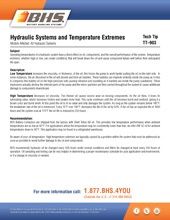We use cookies to make your experience better. To comply with the new e-Privacy directive, we need to ask for your consent to set the cookies. Learn more.
TT-903: Hydraulic Systems and Temperature Extremes
Models Affected: All Hydraulic Systems
Effect of Hydraulic System Operating Temperatures on Oil, Components, and Performance
Description:
Operating temperatures of a hydraulic system have a direct effect on oil, components, and the overall performance of the system. Temperature extremes, whether high or low, can create conditions that will break down the oil and cause component failure well before their anticipated life span.
Low Temperature increases the viscosity, or thickness, of the oil; this forces the pump to work harder pulling the oil on the inlet side. In some instances, the air dissolved in the oil will desorb and form air bubbles. These bubbles can implode violently inside the pump as it tries to compress this bubbly oil on the high-pressure side causing vibration and sounding as if marbles are inside the pump (cavitation). These implosions actually destroy the internal parts of the pump and the micro-particles are then carried throughout the system to cause additional damage to components downstream.
High Temperature decreases oil viscosity. This thinner oil causes excess wear on moving components. As the oil thins, it loses its lubricating value, which increases friction and creates more heat. This cycle continues until the oil becomes burnt and oxidized, giving it a brown color and burnt smell. At this point the oil is of no value and only damages the system. As long as the system remains below 140°F, the breakdown rate of the oil is minimized. Every 15°F over 140°F decreases the life of the oil by 50%. If the oil has an expected life of 1000 hours and the system runs at 170°F the oil life is reduced to 250 hours.
Recommendation:
BHS Battery Extractors are shipped from the factory with Shell Tellus 68 oil. This provides low temperature performance when ambient temperatures are as low as 60°F. For applications where the temperature may be consistently lower than that, we offer AW-32 oil for ambient temperatures down to 40°F. This application may be found in a refrigerated warehouse.
Be aware of your oil temperature. High temperature extremes are typically caused by a problem within the system that must be addressed as soon as possible to avoid further damage to the oil and components.
BHS recommends hydraulic oil be changed every 500 hours under normal conditions and filters be changed at least every 250 hours of operation. Oil sampling and testing can be very helpful in determining a proper maintenance schedule for your application and environment, or if a change in viscosity is needed.


